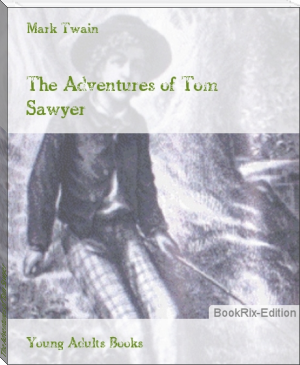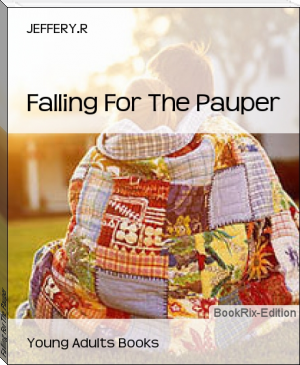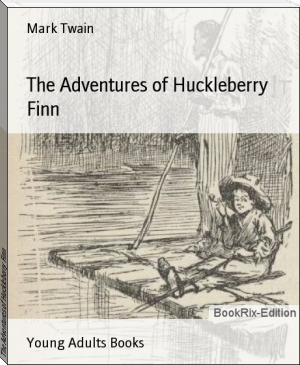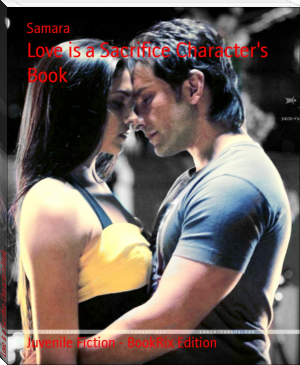The Prince and the Pauper - Mark Twain (ebook reader .TXT) 📗

- Author: Mark Twain
Book online «The Prince and the Pauper - Mark Twain (ebook reader .TXT) 📗». Author Mark Twain
obedience to the King's command so precious a grace might be acquired.
Tom urgedthe woman still adhered to her declarations. Finally he said
"I think the woman hath said true. An' MY mother were in her place and gifted with the devil's functions, she had not stayed a moment to call her storms and lay the whole land in ruins, if the saving of my forfeit life were the price she got! It is argument that other mothers are made in like mould. Thou art free, goodwifethou and thy childfor I do think thee innocent. NOW thou'st nought to fear, being pardonedpull off thy stockings!an' thou canst make me a storm, thou shalt be rich!"
The redeemed creature was loud in her gratitude, and proceeded to obey, whilst Tom looked on with eager expectancy, a little marred by apprehension; the courtiers at the same time manifesting decided discomfort and uneasiness. The woman stripped her own feet and her little girl's also, and plainly did her best to reward the King's generosity with an earthquake, but it was all a failure and a disappointment. Tom sighed, and said
"There, good soul, trouble thyself no further, thy power is departed out of thee. Go thy way in peace; and if it return to thee at any time, forget me not, but fetch me a storm." {13}
Chapter XVI. The State Dinner.
The dinner hour drew nearyet strangely enough, the thought brought but slight discomfort to Tom, and hardly any terror. The morning's experiences had wonderfully built up his confidence; the poor little ash-cat was already more wonted to his strange garret, after four days' habit, than a mature person could have become in a full month. A child's facility in accommodating itself to circumstances was never more strikingly illustrated.
Let us privileged ones hurry to the great banqueting-room and have a glance at matters there whilst Tom is being made ready for the imposing occasion. It is a spacious apartment, with gilded pillars and pilasters, and pictured walls and ceilings. At the door stand tall guards, as rigid as statues, dressed in rich and picturesque costumes, and bearing halberds. In a high gallery which runs all around the place is a band of musicians and a packed company of citizens of both sexes, in brilliant attire. In the centre of the room, upon a raised platform, is Tom's table. Now let the ancient chronicler speak:
"A gentleman enters the room bearing a rod, and along with him another bearing a tablecloth, which, after they have both kneeled three times with the utmost veneration, he spreads upon the table, and after kneeling again they both retire; then come two others, one with the rod again, the other with a salt-cellar, a plate, and bread; when they have kneeled as the others had done, and placed what was brought upon the table, they too retire with the same ceremonies performed by the first; at last come two nobles, richly clothed, one bearing a tasting-knife, who, after prostrating themselves three times in the most graceful manner, approach and rub the table with bread and salt, with as much awe as if the King had been present." {6}
So end the solemn preliminaries. Now, far down the echoing corridors we hear a bugle-blast, and the indistinct cry, "Place for the King! Way for the King's most excellent majesty!" These sounds are momently repeated they grow nearer and nearerand presently, almost in our faces, the martial note peals and the cry rings out, "Way for the King!" At this instant the shining pageant appears, and files in at the door, with a measured march. Let the chronicler speak again:
"First come Gentlemen, Barons, Earls, Knights of the Garter, all richly dressed and bareheaded; next comes the Chancellor, between two, one of which carries the royal sceptre, the other the Sword of State in a red scabbard, studded with golden fleurs-de-lis, the point upwards; next comes the King himselfwhom, upon his appearing, twelve trumpets and many drums salute with a great burst of welcome, whilst all in the galleries rise in their places, crying 'God save the King!' After him come nobles attached to his person, and on his right and left march his guard of honour, his fifty Gentlemen Pensioners, with gilt battle-axes."
This was all fine and pleasant. Tom's pulse beat high, and a glad light was in his eye. He bore himself right gracefully, and all the more so because he was not thinking of how he was doing it, his mind being charmed and occupied with the blithe sights and sounds about himand besides, nobody can be very ungraceful in nicely-fitting beautiful clothes after he has grown a little used to themespecially if he is for the moment unconscious of them. Tom remembered his instructions, and acknowledged his greeting with a slight inclination of his plumed head, and a courteous "I thank ye, my good people."
He seated himself at table, without removing his cap; and did it without the least embarrassment; for to eat with one's cap on was the one solitary royal custom upon which the kings and the Cantys met upon common ground, neither party having any advantage over the other in the matter of old familiarity with it. The pageant broke up and grouped itself picturesquely, and remained bareheaded.
Now to the sound of gay music the Yeomen of the Guard entered,"the tallest and mightiest men in England, they being carefully selected in this regard,"but we will let the chronicler tell about it:
"The Yeomen of the Guard entered, bareheaded, clothed in scarlet, with golden roses upon their backs; and these went and came, bringing in each turn a course of dishes, served in plate. These dishes were received by a gentleman in the same order they were brought, and placed upon the table, while the taster gave to each guard a mouthful to eat of the particular dish he had brought, for fear of any poison."
Tom made a good dinner, notwithstanding he was conscious that hundreds of eyes followed each morsel to his mouth and watched him eat it with an interest which could not have been more intense if it had been a deadly explosive and was expected to blow him up and scatter him all about the place. He was careful not to hurry, and equally careful not to do anything whatever for himself, but wait till the proper official knelt down and did it for him. He got through without a mistakeflawless and precious triumph.
When the meal was over at last and he marched away in the midst of his bright pageant, with the happy noises in his ears of blaring bugles, rolling drums, and thundering acclamations, he felt that if he had seen the worst of dining in public it was an ordeal which he would be glad to endure several times a day if by that means he could but buy himself free from some of the more formidable requirements of his royal office.
Chapter XVII. Foo-foo the First.
Miles Hendon hurried along toward the Southwark end of the bridge, keeping a sharp look-out for the persons he sought, and hoping and expecting to overtake them presently. He was disappointed in this, however. By asking questions, he was enabled to track them part of the way through Southwark; then all traces ceased, and he was perplexed as to how to proceed. Still, he continued his efforts as best he could during the rest of the day. Nightfall found him leg-weary, half-famished, and his desire as far from accomplishment as ever; so he supped at the Tabard Inn and went to bed, resolved to make an early start in the morning, and give the town an exhaustive search. As he lay thinking and planning, he presently began to reason thus: The boy would escape from the ruffian, his reputed father, if possible; would he go back to London and seek his former haunts? No, he would not do that, he would avoid recapture. What, then, would he do? Never having had a friend in the world, or a protector, until he met Miles Hendon, he would naturally try to find that friend again, provided the effort did not require him to go toward London and danger. He would strike for Hendon Hall, that is what he would do, for he knew Hendon was homeward bound and there he might expect to find him. Yes, the case was plain to Hendonhe must lose no more time in Southwark, but move at once through Kent, toward Monk's Holm, searching the wood and inquiring as he went. Let us return to the vanished little King now.
The ruffian whom the waiter at the inn on the bridge saw 'about to join' the youth and the King did not exactly join them, but fell in close behind them and followed their steps. He said nothing. His left arm was in a sling, and he wore a large green patch over his left eye; he limped slightly, and used an oaken staff as a support. The youth led the King a crooked course through Southwark, and by-and-by struck into the high road beyond. The King was irritated, now, and said he would stop hereit was Hendon's place to come to him, not his to go to Hendon. He would not endure such insolence; he would stop where he was. The youth said
"Thou'lt tarry here, and thy friend lying wounded in the wood yonder? So be it, then."
The King's manner changed at once. He cried out
"Wounded? And who hath dared to do it? But that is apart; lead on, lead on! Faster, sirrah! Art shod with lead? Wounded, is he? Now though the doer of it be a duke's son he shall rue it!"
It was some distance to the wood, but the space was speedily traversed. The youth looked about him, discovered a bough sticking in the ground, with a small bit of rag tied to it, then led the way into the forest, watching for similar boughs and finding them at intervals; they were evidently guides to the point he was aiming at. By-and-by an open place was reached, where were the charred remains of a farm-house, and near them a barn which was falling to ruin and decay. There was no sign of life anywhere, and utter silence prevailed. The youth entered the barn, the King following eagerly upon his heels. No one there! The King shot a surprised and suspicious glance at the youth, and asked
"Where is he?"
A mocking laugh was his answer. The King was in a rage in a moment; he seized a billet of wood and was in the act of charging upon the youth when another mocking laugh fell upon his ear. It was from the lame ruffian who had been following at a distance. The King turned and said angrily
"Who art thou? What is thy business here?"
"Leave thy foolery," said the man, "and quiet thyself. My disguise is none so good that thou canst pretend thou knowest not thy father through it."
"Thou art not my father. I know thee not. I am the King. If thou hast hid my servant, find him for me, or thou shalt sup sorrow for what thou hast done."
John Canty replied, in a stern and measured voice
"It is plain thou art mad, and
Tom urgedthe woman still adhered to her declarations. Finally he said
"I think the woman hath said true. An' MY mother were in her place and gifted with the devil's functions, she had not stayed a moment to call her storms and lay the whole land in ruins, if the saving of my forfeit life were the price she got! It is argument that other mothers are made in like mould. Thou art free, goodwifethou and thy childfor I do think thee innocent. NOW thou'st nought to fear, being pardonedpull off thy stockings!an' thou canst make me a storm, thou shalt be rich!"
The redeemed creature was loud in her gratitude, and proceeded to obey, whilst Tom looked on with eager expectancy, a little marred by apprehension; the courtiers at the same time manifesting decided discomfort and uneasiness. The woman stripped her own feet and her little girl's also, and plainly did her best to reward the King's generosity with an earthquake, but it was all a failure and a disappointment. Tom sighed, and said
"There, good soul, trouble thyself no further, thy power is departed out of thee. Go thy way in peace; and if it return to thee at any time, forget me not, but fetch me a storm." {13}
Chapter XVI. The State Dinner.
The dinner hour drew nearyet strangely enough, the thought brought but slight discomfort to Tom, and hardly any terror. The morning's experiences had wonderfully built up his confidence; the poor little ash-cat was already more wonted to his strange garret, after four days' habit, than a mature person could have become in a full month. A child's facility in accommodating itself to circumstances was never more strikingly illustrated.
Let us privileged ones hurry to the great banqueting-room and have a glance at matters there whilst Tom is being made ready for the imposing occasion. It is a spacious apartment, with gilded pillars and pilasters, and pictured walls and ceilings. At the door stand tall guards, as rigid as statues, dressed in rich and picturesque costumes, and bearing halberds. In a high gallery which runs all around the place is a band of musicians and a packed company of citizens of both sexes, in brilliant attire. In the centre of the room, upon a raised platform, is Tom's table. Now let the ancient chronicler speak:
"A gentleman enters the room bearing a rod, and along with him another bearing a tablecloth, which, after they have both kneeled three times with the utmost veneration, he spreads upon the table, and after kneeling again they both retire; then come two others, one with the rod again, the other with a salt-cellar, a plate, and bread; when they have kneeled as the others had done, and placed what was brought upon the table, they too retire with the same ceremonies performed by the first; at last come two nobles, richly clothed, one bearing a tasting-knife, who, after prostrating themselves three times in the most graceful manner, approach and rub the table with bread and salt, with as much awe as if the King had been present." {6}
So end the solemn preliminaries. Now, far down the echoing corridors we hear a bugle-blast, and the indistinct cry, "Place for the King! Way for the King's most excellent majesty!" These sounds are momently repeated they grow nearer and nearerand presently, almost in our faces, the martial note peals and the cry rings out, "Way for the King!" At this instant the shining pageant appears, and files in at the door, with a measured march. Let the chronicler speak again:
"First come Gentlemen, Barons, Earls, Knights of the Garter, all richly dressed and bareheaded; next comes the Chancellor, between two, one of which carries the royal sceptre, the other the Sword of State in a red scabbard, studded with golden fleurs-de-lis, the point upwards; next comes the King himselfwhom, upon his appearing, twelve trumpets and many drums salute with a great burst of welcome, whilst all in the galleries rise in their places, crying 'God save the King!' After him come nobles attached to his person, and on his right and left march his guard of honour, his fifty Gentlemen Pensioners, with gilt battle-axes."
This was all fine and pleasant. Tom's pulse beat high, and a glad light was in his eye. He bore himself right gracefully, and all the more so because he was not thinking of how he was doing it, his mind being charmed and occupied with the blithe sights and sounds about himand besides, nobody can be very ungraceful in nicely-fitting beautiful clothes after he has grown a little used to themespecially if he is for the moment unconscious of them. Tom remembered his instructions, and acknowledged his greeting with a slight inclination of his plumed head, and a courteous "I thank ye, my good people."
He seated himself at table, without removing his cap; and did it without the least embarrassment; for to eat with one's cap on was the one solitary royal custom upon which the kings and the Cantys met upon common ground, neither party having any advantage over the other in the matter of old familiarity with it. The pageant broke up and grouped itself picturesquely, and remained bareheaded.
Now to the sound of gay music the Yeomen of the Guard entered,"the tallest and mightiest men in England, they being carefully selected in this regard,"but we will let the chronicler tell about it:
"The Yeomen of the Guard entered, bareheaded, clothed in scarlet, with golden roses upon their backs; and these went and came, bringing in each turn a course of dishes, served in plate. These dishes were received by a gentleman in the same order they were brought, and placed upon the table, while the taster gave to each guard a mouthful to eat of the particular dish he had brought, for fear of any poison."
Tom made a good dinner, notwithstanding he was conscious that hundreds of eyes followed each morsel to his mouth and watched him eat it with an interest which could not have been more intense if it had been a deadly explosive and was expected to blow him up and scatter him all about the place. He was careful not to hurry, and equally careful not to do anything whatever for himself, but wait till the proper official knelt down and did it for him. He got through without a mistakeflawless and precious triumph.
When the meal was over at last and he marched away in the midst of his bright pageant, with the happy noises in his ears of blaring bugles, rolling drums, and thundering acclamations, he felt that if he had seen the worst of dining in public it was an ordeal which he would be glad to endure several times a day if by that means he could but buy himself free from some of the more formidable requirements of his royal office.
Chapter XVII. Foo-foo the First.
Miles Hendon hurried along toward the Southwark end of the bridge, keeping a sharp look-out for the persons he sought, and hoping and expecting to overtake them presently. He was disappointed in this, however. By asking questions, he was enabled to track them part of the way through Southwark; then all traces ceased, and he was perplexed as to how to proceed. Still, he continued his efforts as best he could during the rest of the day. Nightfall found him leg-weary, half-famished, and his desire as far from accomplishment as ever; so he supped at the Tabard Inn and went to bed, resolved to make an early start in the morning, and give the town an exhaustive search. As he lay thinking and planning, he presently began to reason thus: The boy would escape from the ruffian, his reputed father, if possible; would he go back to London and seek his former haunts? No, he would not do that, he would avoid recapture. What, then, would he do? Never having had a friend in the world, or a protector, until he met Miles Hendon, he would naturally try to find that friend again, provided the effort did not require him to go toward London and danger. He would strike for Hendon Hall, that is what he would do, for he knew Hendon was homeward bound and there he might expect to find him. Yes, the case was plain to Hendonhe must lose no more time in Southwark, but move at once through Kent, toward Monk's Holm, searching the wood and inquiring as he went. Let us return to the vanished little King now.
The ruffian whom the waiter at the inn on the bridge saw 'about to join' the youth and the King did not exactly join them, but fell in close behind them and followed their steps. He said nothing. His left arm was in a sling, and he wore a large green patch over his left eye; he limped slightly, and used an oaken staff as a support. The youth led the King a crooked course through Southwark, and by-and-by struck into the high road beyond. The King was irritated, now, and said he would stop hereit was Hendon's place to come to him, not his to go to Hendon. He would not endure such insolence; he would stop where he was. The youth said
"Thou'lt tarry here, and thy friend lying wounded in the wood yonder? So be it, then."
The King's manner changed at once. He cried out
"Wounded? And who hath dared to do it? But that is apart; lead on, lead on! Faster, sirrah! Art shod with lead? Wounded, is he? Now though the doer of it be a duke's son he shall rue it!"
It was some distance to the wood, but the space was speedily traversed. The youth looked about him, discovered a bough sticking in the ground, with a small bit of rag tied to it, then led the way into the forest, watching for similar boughs and finding them at intervals; they were evidently guides to the point he was aiming at. By-and-by an open place was reached, where were the charred remains of a farm-house, and near them a barn which was falling to ruin and decay. There was no sign of life anywhere, and utter silence prevailed. The youth entered the barn, the King following eagerly upon his heels. No one there! The King shot a surprised and suspicious glance at the youth, and asked
"Where is he?"
A mocking laugh was his answer. The King was in a rage in a moment; he seized a billet of wood and was in the act of charging upon the youth when another mocking laugh fell upon his ear. It was from the lame ruffian who had been following at a distance. The King turned and said angrily
"Who art thou? What is thy business here?"
"Leave thy foolery," said the man, "and quiet thyself. My disguise is none so good that thou canst pretend thou knowest not thy father through it."
"Thou art not my father. I know thee not. I am the King. If thou hast hid my servant, find him for me, or thou shalt sup sorrow for what thou hast done."
John Canty replied, in a stern and measured voice
"It is plain thou art mad, and
Free e-book «The Prince and the Pauper - Mark Twain (ebook reader .TXT) 📗» - read online now
Similar e-books:





Comments (0)